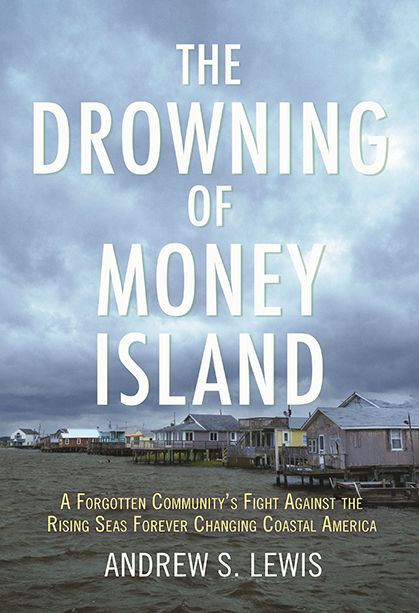The story of the Bayshore, a community ravaged by Superstorm Sandy, where lack of recovery, sea level rise, and a state effort to buy out and demolish neighborhoods has fractured the community and foreshadowed coastal America’s sinking future.
“A must-read for anyone interested in how climate change is already deepening preexisting inequality. Meticulously and emphatically reported, The Drowning of Money Island invites readers to confront the difficult decisions that come with storm recovery in our era of higher tides and supercharged hurricanes. Stay or go, rebuild or retreat? The way we answer these questions will define who we become. —Elizabeth Rush, author of Rising: Dispatches from the New American Shore
“While by no means a one-sided polemic on doomsday scenarios, this excellent read does serve as a clarion call for those who question climate change.” —Booklist
“This book humanizes the experience in ways that others have not.” —Library Journal
“[A] thoughtful, probing study.”
—Publisher’s Weekly
Purchase at: Beacon Press, Amazon, IndieBound, or Barnes&Noble
ADDITIONAL PRAISE FOR THE DROWNING OF MONEY ISLAND
“Elizabeth Kolbert’s The Sixth Extinction revealed the unnatural history of life’s struggle across Earth’s ice ages and water worlds. Andrew Lewis’s The Drowning of Money Island tells that story as it is happening, now, to the Delaware Bay neighbors of his rural hometown, where entire communities have been forced to abandon their homes and their American dreams. Lewis limns the region’s history to explain how rising waters threaten the watermen’s homes, their jobs, their children’s future, and their way of life”
—Craig Nelson, bestselling author of Rocket Men and The Age of Radiance
“A deeply insightful narrative of both cultural and ecological migrations, The Drowning of Money Island shows us that while government agencies use cost-benefit equations to decide which neighborhoods should stay or go, the true cost of displacing people, disrupting cultural identity, is largely unrealized and undervalued. If this book were in the hands of our leadership today, they would understand the true cost of climate change and the moral obligation to move quickly to prevent harm to future generations.”
—Marcus Erikson, author of Junk Raft and cofounder of the 5 Gyres Institute
“The Drowning of Money Island is a heartbreaking chronicle of the evolution of one coastal community in the age of climate disruption. Lewis writes lucidly of the tension between retreat and resilience, and portrays a seaside landscape – its marshes, waterways, and fishes, and the kind of people drawn to them – with bracing honesty. This is a remarkable book.”
—Amy Seidl, author of Finding Higher Ground: Adaptation in the Age of Warming
“Climate change is wrecking peoples’ lives today. Even Americans. Lewis’s lyrical homage to a community all too literally on the edge, warns of a million tragedies to come. The guardians of our coasts talk of ‘managed retreat’ in the face of rising tides. For the people of the Bayshore, Superstorm Sandy proved to be the tipping point to managed demolition of their community.”
—Fred Pearce, author of Fallout: Disasters, Lies, and the Legacy of the Nuclear Age
“Both insider and journalist, reporter and member of the vanishing world he describes, Andrew Lewis delivers a resonant story of rising seas, grit, and loss on a working class stretch of New Jersey coast known as the Bayshore. Lewis is a keen-eyed observer of mores, gesture, landscape, and sky, but The Drowning of Money Island sings most beautifully because he grew up on this shore. Climate change has struck, and we experience this singular community’s fight for survival as if it were our own. One of the many reasons to read this book is that before long, it might be.
—Michael Greenberg, author of Hurry Down Sunshine

